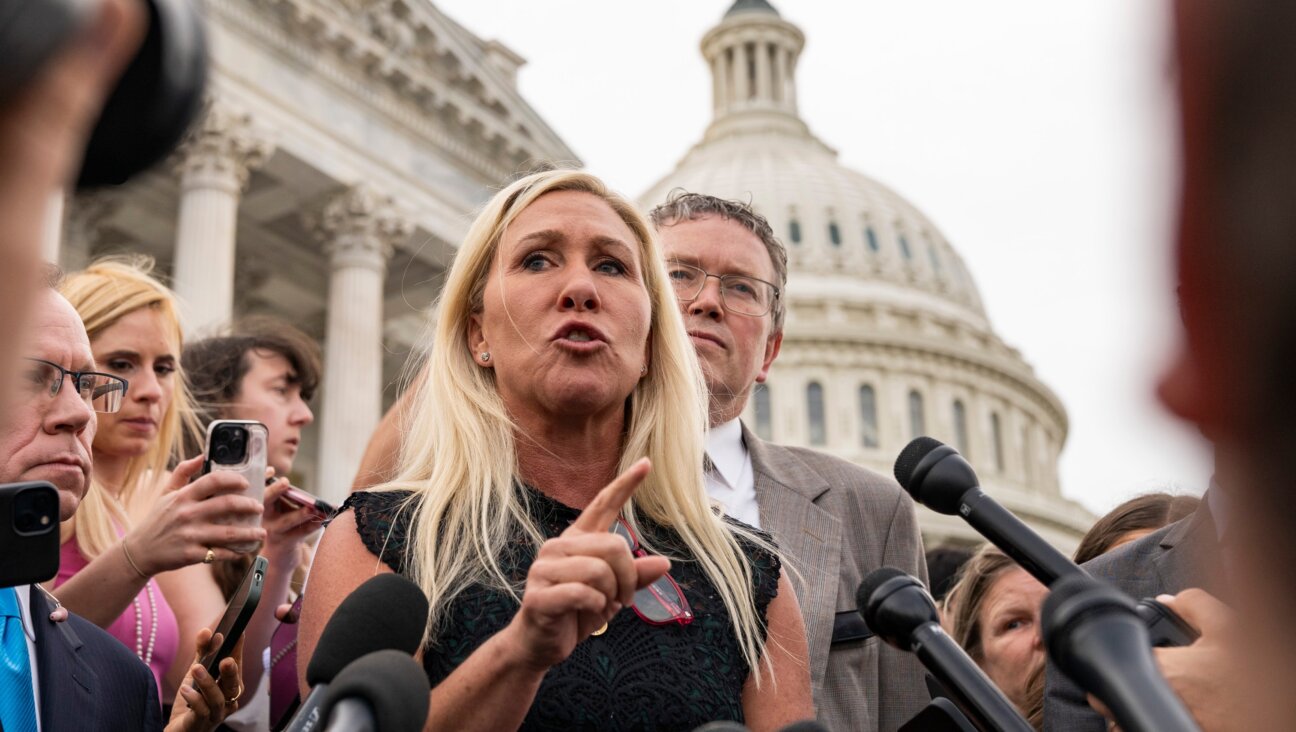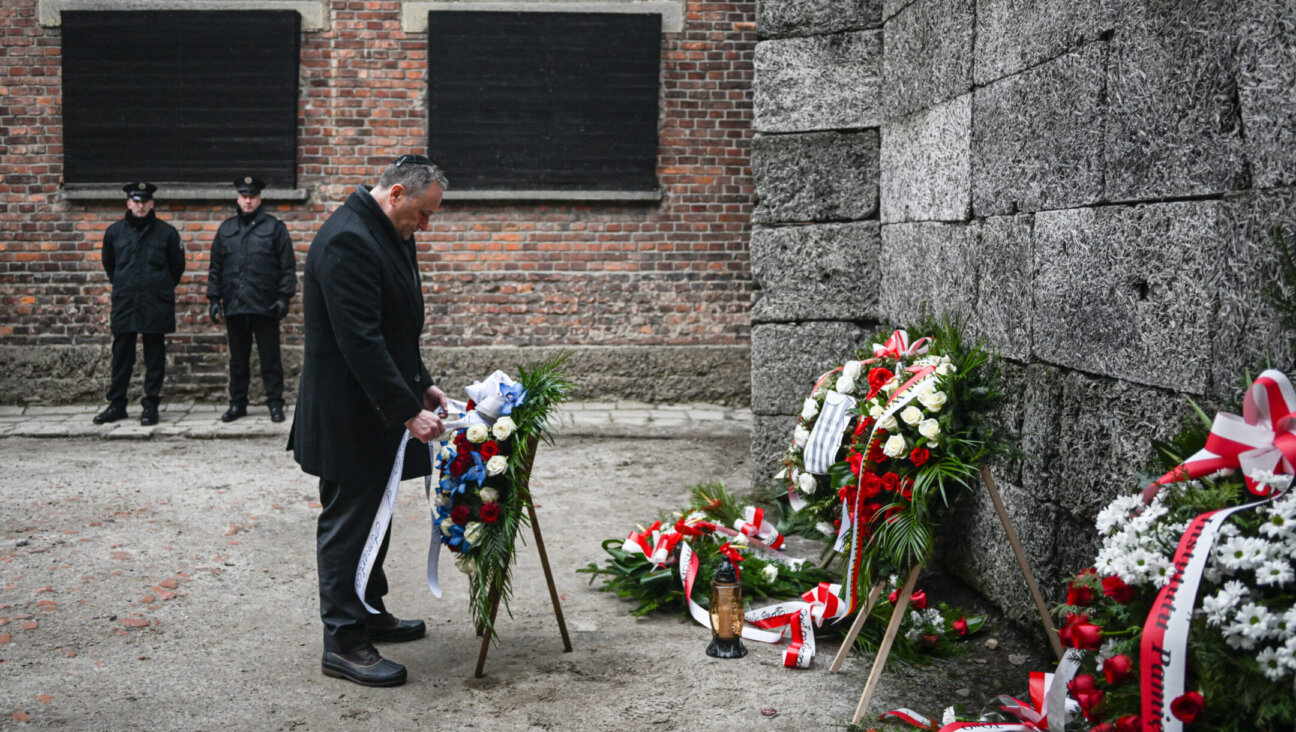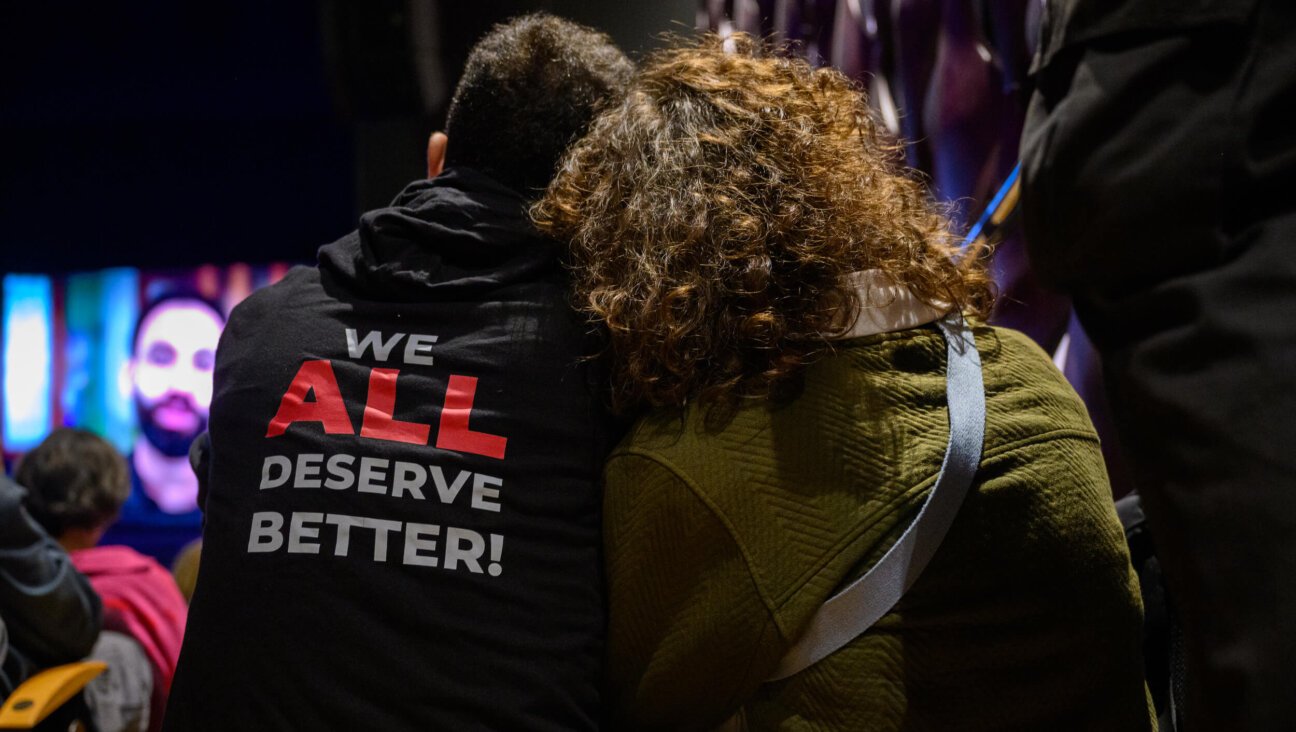What Kind of Interviewer Confuses Hamas and Hummus?
They took us down winding stone stairs and through long corridors, ostensibly to have some make-up dabbed on our noses for the cameras, in fact to meet the interviewer and test his disguise. We confronted a tall, blond-ish man in his thirties, dressed in leather and studs, his face heavily powdered, his arms and chest shaven. He spoke in a heavy German accent, his movements and mannerisms ultra-gay. He tried to write down our names, but they came out dyslexic.
“This guy is going to interview us?”
“Don’t worry, he knows what questions to ask you,” an assistant producer replied.
We did worry. But we had signed a contract or release form (we’re both interviewed so frequently, neither of us bothered to read it carefully). And we, an Israeli and a Palestinian, are gentlemen; we do what we promise to do. Besides, we had been suggested to the production company by a respected Middle East expert in Washington whom we both know. We had bargained for a fee and received it. Rob, the producer who spoke to us earlier on the phone, had a British accent and seemed serious and professional. The interview was taking place in an appropriate setting, near the Zion Gate of the Old City of Jerusalem. Obviously, this production company, with its three cameras and large coterie of assistants, was serious and very professional.
We had been asked to be interviewed for a documentary that would explain the Israeli-Palestinian conflict to the youth of the world. A worthy cause. The producers explained that our interviewer, a German rock star, was the perfect person to establish strong communication with our audience. Perfect, also, because neither of us knows anything about rock stars, German or otherwise.
We were then kept waiting for an hour, a delay for which we were given a variety of production-related excuses. The interviewer disappeared. We had other engagements and were beginning to study our watches and complain. By the time the interview began, we were preoccupied with our scheduling problems. We were told that, considering the nature of our audience, the questions would focus on the most basic issues.
And they were, indeed, basic, relating to our expectations for the Israeli-Palestinian peace process. Then one of us mentioned Hamas, and the exchange that ensued went something like this:
“Vait, vait. Vat’s zee connection between a political movement and food. Vy hummus?”
We exchanged astonished glances. “Hamas,” we explained, “is a Palestinian Islamist political movement. Hummus is a food.”
“Ya, but vy hummus? Yesterday I had to throw away my pita bread because it vas dripping hummus. Unt it’s too high in carbohydrates.”
The Hamas-hummus confusion went on for several minutes. Then, the interviewer declared: “Your conflict is not so bad. Jennifer-Angelina is worse.”
We probed our limited memory of Hollywood scandals: Was he comparing the Israeli-Palestinian conflict to some sort of tension between Brad Pitt’s former and current wives?
What was going on here? Should we pull off our microphones, get up and leave? We exchanged worried glances. “Could we take a break?” one of us asked meekly. The request was ignored.
And so it went. The cameras kept rolling, the cameramen never cracking a smile. “Vy don’t you Jews and Arabs settle the conflict with a time share on the land?” “Ven vill you Jews return the pyramids?” “Vy can’t Jews and Hindus get along?”
Jews and Hindus?
We played it straight and square. Nay, we simply are straight and square. We smiled at the idiotic questions and answered them patiently. We remonstrated that this was no way to help the youth of the world understand the depth and tragedy of our conflict. When presented with more straightforward questions, we eagerly demonstrated our disagreements on fundamental issues like refugees and who started the conflict. We knew something ludicrous was happening but couldn’t quite figure it out. Besides, we ourselves were not being ridiculed — only the conflict that occupies and preoccupies us. And we were pressured for time and just wanted to finish.
Our rock-star host concluded with a mind-boggling song about the epic Middle East conflict between Jews and Hindus. At the crescendo, he grabbed our hands and joined them with his. Unlike Mahmoud Abbas and Ehud Olmert (or President Bush and Saudi Arabia’s King Abdullah), my Palestinian fellow interviewee and I are not hand-holders, but we suffered through it. As we started to hurry away, the interviewer followed us, cameras still rolling, peppering us with nonsense questions about being taken hostage and having his throat slit on camera.
Yes, dear reader, Sacha Baron Cohen is loose in the Middle East. The end product will undoubtedly be hilarious. We’ll try to be good sports about it.
But will Sacha Baron Cohen? He is exploiting our tragic and painful conflict in the most cynical and deceptive manner. I doubt he’ll give us anything in return.
Yossi Alpher is the Israeli co-editor of bitterlemons.org.
The Forward is free to read, but it isn’t free to produce

I hope you appreciated this article. Before you go, I’d like to ask you to please support the Forward.
Now more than ever, American Jews need independent news they can trust, with reporting driven by truth, not ideology. We serve you, not any ideological agenda.
At a time when other newsrooms are closing or cutting back, the Forward has removed its paywall and invested additional resources to report on the ground from Israel and around the U.S. on the impact of the war, rising antisemitism and polarized discourse.
This is a great time to support independent Jewish journalism you rely on. Make a gift today!
— Rachel Fishman Feddersen, Publisher and CEO
Support our mission to tell the Jewish story fully and fairly.
Most Popular
- 1

Fast Forward Why the Antisemitism Awareness Act now has a religious liberty clause to protect ‘Jews killed Jesus’ statements
- 2

Culture Trump wants to honor Hannah Arendt in a ‘Garden of American Heroes.’ Is this a joke?
- 3

Fast Forward The invitation said, ‘No Jews.’ The response from campus officials, at least, was real.
- 4

Opinion A Holocaust perpetrator was just celebrated on US soil. I think I know why no one objected.
In Case You Missed It
-

Music After over decades of waiting, we’re finally getting a Bob Dylan-Barbra Streisand duet
-

Art How a Lower East Side Jew conquered the multiverse
-

Fast Forward Right-wing activists riot outside Israeli-Palestinian memorial event at Reform synagogue in Israel
-

Fast Forward Trump fires Doug Emhoff from Holocaust Memorial Council
-
Shop the Forward Store
100% of profits support our journalism
Republish This Story
Please read before republishing
We’re happy to make this story available to republish for free, unless it originated with JTA, Haaretz or another publication (as indicated on the article) and as long as you follow our guidelines.
You must comply with the following:
- Credit the Forward
- Retain our pixel
- Preserve our canonical link in Google search
- Add a noindex tag in Google search
See our full guidelines for more information, and this guide for detail about canonical URLs.
To republish, copy the HTML by clicking on the yellow button to the right; it includes our tracking pixel, all paragraph styles and hyperlinks, the author byline and credit to the Forward. It does not include images; to avoid copyright violations, you must add them manually, following our guidelines. Please email us at [email protected], subject line “republish,” with any questions or to let us know what stories you’re picking up.















